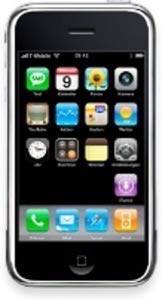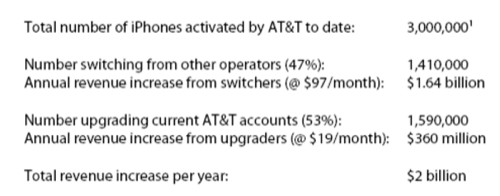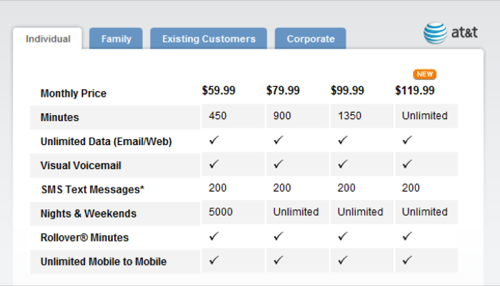A recent survey of iPhone users put out by Rubicon Consulting entitled “The Apple iPhone: Successes and Challenges for the Mobile Industry,” reveals some interesting demographics about the typical iPhone user, their satisfaction with the device, and the revenue that the iPhone brings to AT&T. Not surprisingly, it seems that iPhone users are very satisfied with the product and are making heavy use of features like email and web browsing. The increased use of these types of data functions has also led to higher bills, which produces about $2 billion in additional revenue for AT&T, the exclusive iPhone carrier for the U.S., as well as higher bills for iPhone owners.

iPhone Users
The survey, which focuses on U.S. users, shows that the iPhone user base consists mainly of young early adopters about 75% of whom are previous Apple customers.
This coincides with other Apple-related findings just released regarding today’s younger generation: a Morgan Stanley survey reveals that 40% of college students say their next computer purchase will be a Mac.
The kids like their Apple products.
Many of the iPhone users are young. Half are under thirty. Fifteen percent are students.
When asked to rate their level of technology expertise, most described themselves as technically sophisticated, a reminder that, for now, many of the iPhones are still in the hands of early adopters, a typically technically-savvy group.
iPhone Usage
The iPhone survey shows that half of the iPhone users replaced conventional mobile phones (most often the Razr) while 40% replaced other smartphones (like Blackberrys and Windows Mobile devices).
For the iPhone owners, email is the number one function utilized on the phone, with 70% of users checking their inboxes at least once per day. Web browsing runs a close second, with 60% of users surfing at least once per day. A majority of users, 75%, says that they do a lot more mobile browsing than they did with their previous phone, and with half of them coming from conventional cell phones, that’s not a big shock.
What is interesting is that for a quarter of the iPhone owners, the iPhone is displacing the notebook computer. Twenty-eight percent of those surveyed responded that they are now often carrying an iPhone instead of their notebook computer. So it’s almost as if the iPhone and Macbook Air are competing for the same customer.
Despite the iPhone’s ability to get more people surfing the web, 40% responded that the iPhone has trouble displaying some of the web sites they want to visit. This is most likely due to iPhone lack’s of Flash (our coverage). And with Windows Mobile’s licensing of Flash Lite, Apple’s going to feel some pressure to resolve the issues preventing Flash from coming to the iPhone.
AT&T For the Win
Despite the all the unlocking tools and hacks, 82% of those surveyed report their phone is not unlocked. This is good news for AT&T, who is raking in the profits – nearly $2 billion in increased revenues.
From the survey, here’s how the $2 billion was calculated:

Some of that revenue gets shared with Apple – rumored to be at $18 per phone – but not all. And now that the switchers are AT&T customers, there’s the potential to up-sell them from basic plans to ones that generate even higher revenue, like those pricier ones listed in the chart below:

For the iPhone users, switching to the iPhone meant phone bills that increased by an average of 24%. They don’t seem to mind, though, since the typical iPhone use is richer than the average – in fact, iPhone users reported household incomes are about 40% higher than the U.S. median. However, this finding is consistent with early adopters for technology products.
So, What Does It All Mean?
Now, the challenge for Apple is to get their product beyond the youthful technophiles and into the hands of mainstream users in order to maintain sustained growth. While the early adopters are a great group for launching a product, without mainstream use, the early success won’t last.
Apple’s recently announced support for Microsoft Exchange is a step in the right direction in order to get business users on board, a move that may push more mainstream adoption.
But even so, the high price stymies some potential purchasers (cough cough), and the phone’s relative success is currently US-only – its sales in Europe have not been as promising nor does it make use of Europe’s 3G networks.
However, the iPhone has already had a lasting impact on the mobile industry: its very creation put pressure on other mobile companies to deliver more PC-like phones with better browsers which will push forward greater adoption of mobile web.










